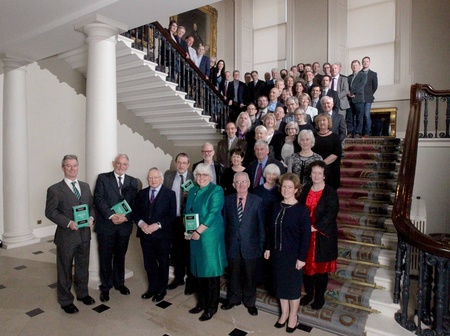University of Aberdeen academics have played a key role in the creation of a new four volume work described as the most comprehensive and authoritative history of Ireland yet attempted.
Edited by Professor Thomas Bartlett, emeritus Professor of History at the University, the landmark survey was launched at Dublin Castle by Irish President Michael D. Higgins.
The University’s Dr Colin Barr and Professor Michael Brown were among 100 leading historians from around the world who contributed to The Cambridge History of Ireland which presents the Irish story – or stories – from 600 to the present. Its four comprehensive volumes bring together the latest scholarship, setting Irish history within broader Atlantic, European, imperial and global contexts.
The work benefits from a strong political narrative framework, and is distinctive in including essays that address the full range of social, economic, religious, linguistic, military, cultural, artistic and gender history, and in challenging traditional chronological boundaries in a manner that offers new perspectives and insights.
Each volume examines Ireland’s development within a distinct period, and offers a complete and rounded picture of Irish life, while remaining sensitive to the Irish experience.
The first volume of The Cambridge History of Ireland presents the latest thinking on key aspects of the medieval Irish experience, focusing on the extent to which developments were unique to Ireland.
Volume II looks at the transformative and tumultuous years between 1550 and 1730, offering fresh perspectives on the political, military, religious, social, cultural, intellectual, economic and environmental history of early modern Ireland.
Volume III addresses the 18th and 19th centuries as an era of continuity as well as change moving beyond the familiar political narrative to engage with the economy, society, population, emigration, religion, language, state formation, culture, art and architecture, and the Irish abroad
The final volume covers the period from the 1880s to the present with an insightful interpretation on the emergence and development of Ireland during these often turbulent including special features on images of the "Troubles" and on Irish art and sculpture in the 20th century.
At the celebration in Dublin Castle President Michael D. Higgins commented on the impressive scholarship contained in the four volumes.
He said: “These four volumes stand as an intellectual riposte to those who doubt the vital importance of the study of history in our universities and in our society. I was kindly provided with galley proofs of the Cambridge History of Ireland six weeks ago, and I can attest to the rigour of the scholarship contained within its pages.
“May I then commend the editors, the 103 contributors from 38 different countries, and the Cambridge University Press not only for the quality of the essays contained within the volumes but also for the alacrity with which you set yourselves to this task.”
The President continued: “Our history is the inheritance of all our people, its interpretation a matter for all of us, and a republic worthy of the name would seek to organise the material of history to make it as accessible as possible to all the people.”
Dr Barr, who contributed to a chapter concerning “The re-energising of Catholicism, 1830-1880” said it was an honour to be involved in such a comprehensive project.
“This was an ambitious project which has brought together academics from around the world and I am pleased to have been able to play my part in such a landmark piece of work.
“The editors, including the University’s emeritus Professor of History, Tom Bartlett, have done a tremendous job in creating the most comprehensive and authoritative history of Ireland yet attempted
“I hope this will make an important contribution to the ongoing history of Ireland and act as a springboard to future investigation.”


